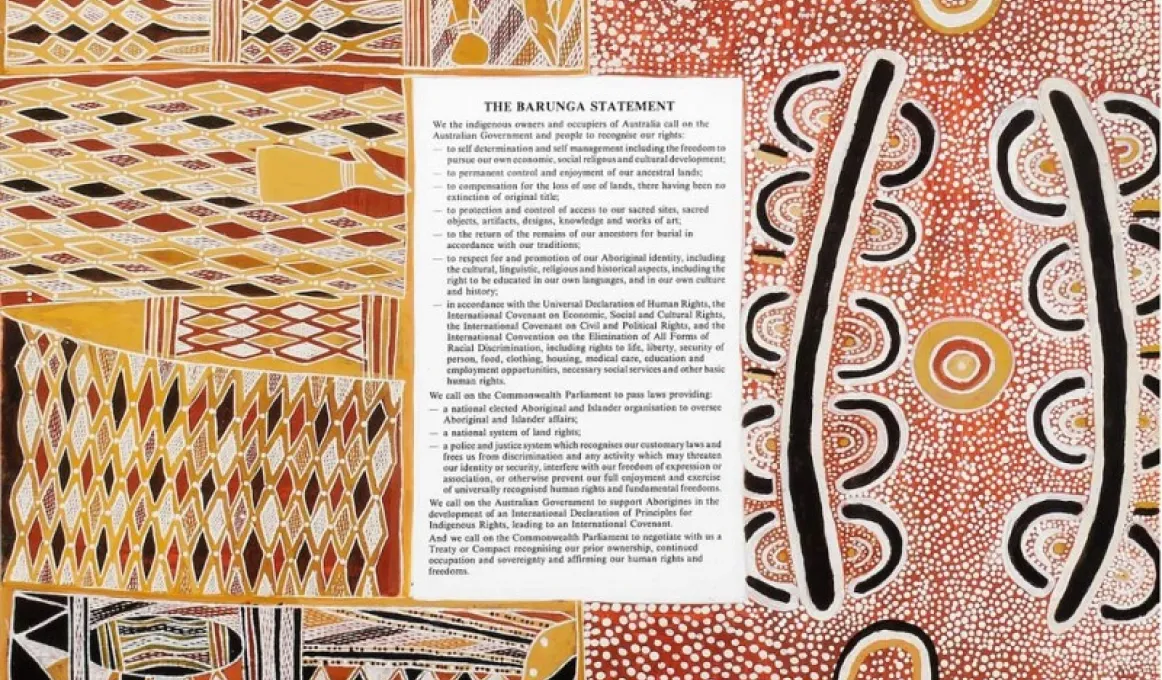35 years since the Barunga Statement

This long weekend, thousands of visitors will arrive in the Northern Territory town of Barunga – which usually has a population of about 360 – for the annual Barunga Festival.
This long weekend, thousands of visitors will arrive in the Northern Territory town of Barunga – which usually has a population of about 360 – for the annual Barunga Festival.
The yearly event celebrates and preserves Indigenous art, dance, sport, music and culture. The festival is also about taking time to listen to one another and to engage with political issues of the day.
According to Bangardi Robert Lee, who created the Festival: ‘The main aim of the festival is to bring people together, sharing and understanding each other’s problems. This way we can get to know one another properly.’
Running since 1985, the Barunga Festival has a key place in Australian history as the home of the Barunga Statement, presented 35 years ago this year.
In 1988 (the bicentennial year of European settlement) then Prime Minister Bob Hawke attended the Festival, where he was presented with a statement of objectives now known as the Barunga Statement.
The result of lengthy engagement between the Australian Government and Aboriginal leaders in the NT, the Statement called for Indigenous rights, land rights, and a treaty between First Nations and non-Aboriginal peoples.
Painted on a 1.2 metre square sheet of composite wood, the Statement now hangs on display in Parliament House in Canberra. Hawke’s last act as Prime Minister was to hang the Barunga Statement, which he did one minute before Paul Keating was sworn in on 20 December 1991.
At the time, Mr Hawke said: ‘Its presence here calls on those who follow me, it demands of them that they continue efforts that they find solutions to the abundant problems that still face the Aboriginal people of this country.’
In June 1991, the rock band Yothu Yindi released their hit song Treaty, which was inspired by presentation of the Barunga Statement at the 1988 festival.
The full text of the Barunga Statement is as follows:
We, the Indigenous owners and occupiers of Australia, call on the Australian Government and people to recognise our rights:
- to self-determination and self-management, including the freedom to pursue our own economic, social, religious and cultural development;
- to permanent control and enjoyment of our ancestral lands;
- to compensation for the loss of use of our lands, there having been no extinction of original title;
- to protection of and control of access to our sacred sites, sacred objects, artefacts, designs, knowledge and works of art;
- to the return of the remains of our ancestors for burial in accordance with our traditions;
- to respect for and promotion of our Aboriginal identity, including the cultural, linguistic,
- religious and historical aspects, and including the right to be educated in our own languages and in our own culture and history;
- in accordance with the universal declaration of human rights, the international covenant on economic, social and cultural rights, the international covenant on civil and political rights, and the international convention on the elimination of all forms of racial discrimination, rights to life, liberty, security of person, food, clothing, housing, medical care, education and employment opportunities, necessary social services and other basic rights.
We call on the Commonwealth to pass laws providing:
- A national elected Aboriginal and Islander organisation to oversee Aboriginal and Islander affairs;
- A national system of land rights;
- A police and justice system which recognises our customary laws and frees us from discrimination and any activity which may threaten our identity or security, interfere with our freedom of expression or association, or otherwise prevent our full enjoyment and exercise of universally recognised human rights and fundamental freedoms.
- We call on the Australian Government to support Aborigines in the development of an international declaration of principles for indigenous rights, leading to an international covenant.
And we call on the Commonwealth Parliament to negotiate with us a Treaty recognising our prior ownership, continued occupation and sovereignty and affirming our human rights and freedom.
Find out more
Read about the history of the Festival and view this year’s program at: https://barungafestival.com.au/
Learn more about the Barunga Statement: The Barunga Statement | AIATSIS